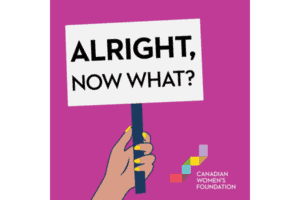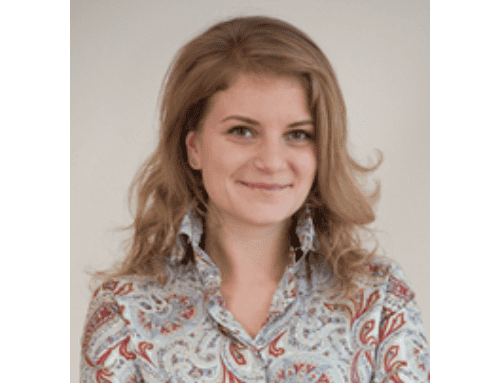 Northern Canada experiences some of the highest rates of violence, poverty, and health concerns and lower access to basic services. Legacies of colonialism and residential schools have eroded local connectedness and sense of identity.
Northern Canada experiences some of the highest rates of violence, poverty, and health concerns and lower access to basic services. Legacies of colonialism and residential schools have eroded local connectedness and sense of identity.
Indigenous gender justice leaders in the North know the solutions to these challenges and what women, girls, and gender-diverse people need to reclaim connections to land and culture. They’re catalysts for sustainable and healthy futures.
Delma Autut leads the Northern Strategy, a granting partnership between Canadian Women’s Foundation and MakeWay Foundation. With the guidance of the Northern Women and Girls Advisory Committee, strong relationships have been built with groups like Northern Birthwork Collective, which leads an Accessible Doula Support Program and Indigenous Doula Training, and Messy Book Program of Arctic Rose Foundation, which leads after-school programming for girls and youth. Delma shares some of the live issues in the North and what it means to take Indigenizing approaches to building gender justice in the region.
Transcript
00:00:05 Andrea
Women, girls, and Two Spirit, trans, and non-binary people in Northern Canada face unique challenges and address those challenges in unique ways. What are the key issues today … and what does it mean to take Indigenizing approaches to address them?
I’m Andrea Gunraj. Welcome to Alright, Now What?, a podcast of the Canadian Women’s Foundation. We put an intersectional feminist lens on stories that make you wonder “Why is this still happening?” We explore systemic roots and strategies for change that will move us closer to the goal of gender justice.
The work of the Canadian Women’s Foundation and our partners takes place on traditional First Nations, Métis, and Inuit territories. We are grateful for the opportunity to meet and work on this land. However, we recognize that land acknowledgements are not enough. We need to pursue truth, reconciliation, decolonization, and allyship in an ongoing effort to make right with all our relations.
Northern Canada experiences some of the highest rates of violence, poverty, and poor health. This has only intensified in the pandemic context. They tend to have least access to basic services—like transportation and community programs. And legacies of colonialism and residential schools have eroded local connectedness and sense of identity.
Indigenous gender justice leaders in the North know the solution to these challenges and what women, girls, and gender-diverse people need to reclaim connections to land and culture. They’re catalysts for sustainable and healthy futures.
Between National Indigenous History Month in June and looking forward to National Day for Truth and Reconciliation in September, I been especially grateful for the efforts of First Nations, Metis, and Inuit grantee partners of the Canadian Women’s Foundation.
Delma Autut leads our Northern Strategy, a granting partnership between Canadian Womens’ Foundation and MakeWay Foundation. With the guidance of a Northern Women and Girls Advisory Committee, strong relationships have been built with groups like Northern Birthwork Collective, which leads an Accessible Doula Support Program and Indigenous Doula Training, and Messy Book Program of Arctic Rose Foundation, which leads after-school programming for girls and youth.
The Northern Advisory Committee developed 4 areas of focus:
1. Uplifting women’s contemporary roles and responsibilities in family and community, often through the reclamation of Indigenous culture and tradition.
2. Empowering programming led by Indigenous health and wellness institutions and increasing cultural competency within public health and wellness institutions.
3. Centering and reconciling gender relationships in family and community as a pathway to end violence.
4. Expanding culturally appropriate, community-driven, and secure childcare services to reduce barriers to northern Indigenous women’s economic independence.
Delma joins me to shares some of the live issues in the North right now and what it means to take Indigenizing approaches to building gender justice in the region.
00:03:03 Delma
I’m Delma Autut, I’m originally from a small town of 350 people. It’s called Chesterfield Inlet in Nunavut. I’m an Inuk, born and raised in Nunavut. Prior to the summer, I was living in Iqualuit, which is the capital city of Nunavut. I’ll be heading back to my hometown after the summer which I’m really excited about because there’s a lot of hunting and berry picking and, you know, getting connected back into family and small town life. So that’s a little bit about me. I have two small children and they are eight and 10.
I work for Canadian Women’s Foundation in partnership with MakeWay on the northern women and girls program, which I started with both organizations in April 2020. So it was a pretty interesting time for everyone, but definitely an interesting time to start a new role.
00:03:58 Andrea
From your perspective, what are the top concerns today, 2022, when it comes to pushing for gender justice in the north?
00:04:06 Delma
There’s always a lot that could be improved, a lot of areas that we could be focusing on. I work with a group of women who are on the Advisory Committee for the Northern Women and Girls Program. We actually recently had our meeting, our last advisory meeting, a couple of weeks ago in Yellowknife, which was really beautiful to see and hear from all of the ladies we have from across the Yukon. And we’ll be recruiting right into Nunavik and Nunavut, but we talked about priority areas and areas in each of the regions that we should be focusing on or they would like to see us focusing. One of the main topics that had come up, which is kind of, I feel like it’s right across the board, not only in the north as well, but homelessness is a really big issue.
And then the lack of shelters – we’ve had quite a bit of conversations and there’s been discussions with organizations as well in moving forward and what that looks like for women because there’s not a lot of support in terms of shelters. There’s definitely women’s shelters, but in the bigger centers, bigger communities in Nunavut. But there’s still not enough.
Another topic that we had talked about was food security, especially post pandemic – while we kind of still are in, but after the pandemic hit, that how food security is so you see it everywhere. We’ve distributed hampers, we’ve supported organisations in providing food hampers for their prenatal programs, for their moms, for their families, and how important that is in the north.
There’s other areas that we had discussed. There’s one pretty big cultural revitalization programs as well, so getting reconnected with your culture has been a really big move forward for Indigenous people right across the north, and we’ve supported quite a bit for organizations. We’ve supported the Inuit women’s sewing program in the west, which is really cool because it connected elders with the younger generation in creating their own garments and creating their own parkas and coats and stuff for the winter, so I think it’s a pretty cool program.
We’ve also supported different areas in the north in terms of programming, one of which is very near and dear to my heart is the Northern Birthwork Collective. You know, we’ve met with them, we’ve gotten pretty close with them, working closely with them and they do really amazing work in the north.
00:06:54 Andrea
What I find so exciting about the Northern strategy is that it’s all about deep relationships with local people doing changemaking work, it’s community centered and grounded. Tell me more about why that’s so important to you.
00:07:06 Delma
It’s so important. I feel like we’ve had, I’ve had conversations with organizations, that a lot of the funding has mostly been in government funding and it’s very rare, and it’s only coming up in, you know, more recent years that, you know, there’s organizations like the Canadian Women’s Foundation and MakeWay that are coming up and supporting very important programming. But what’s really cool about these two organizations coming up is the flexibility, and I think that’s kind of what people are caught off guard when I’m talking to organizations about both grantmaking in the north from both organizations, they’re pretty surprised at how flexible the grantmaking is, and some people have been like, where have you guys been? And it’s pretty, it’s really interesting to see, and it’s very flexible, it’s a very relationship based. I’ve talked to our colleagues from both organizations and I’ve said, if you want to come to the north and you want to work in the north, you have to build those relationships, you have to be a part of that community, you know, and take part in those activities and be open. And one of the things that we’ve discussed within both organizations is that, working in the north, it’s all relationship-based. As big as the North is, it’s very, very big land mass-wise, but it’s also a very small community, because if you don’t know someone from this organization, someone you know probably knows that organization, so it’s very well connected and I think that’s a big part of it, is that maintaining that relationship, connecting with people is a really big part of the work that we do in the north.
Through MakeWay, we’ve supported organizations that have delivered gatherings prior to the pandemic, and actually, they’re just getting started back up. So there was one recently that was done in the north and we received reports and we received, you know, feedback from participants. And it’s so important to maintain those connections and how moving forward that piece was taken out for two years where people didn’t see each other in person. That connection, as much as it was there, it’s needed in person, supporting organizations that deliver gatherings around suicide prevention, around cultural revitalization, I think that’s very important to people in the north, and that’s, you know, that’s an area that the northern program will definitely be focusing around.
00:10:05 Andrea
What are some key learnings in the Indigenizing granting work that you’ve done that can help us better support the efforts in the north?
00:10:12 Delma
Be flexible (laughs). I’m always encouraging learning about other people and other cultures and respecting that there are differences. There’s people – there’s, so like everyone is different and understanding and respecting that or try to understand, anyway.
I was in a decolonization and cultural revitalization program over Zoom, and we discuss things like colonial practices and how that impacted the north. You know, taking part in learning about the north and about Indigenous people, but doing that with an open heart or open mind and having that – trying to have that understanding and being flexible as well. And I think, you know, just being there and supportive is one of the main things that I try to encourage others to do.It goes both ways, so, that’s one of the things.
And when I say be flexible, when we work in the north, we’re on northern time. And I know, Andrea, we’ve been wanting to have this for a couple of weeks. I put you on northern time and I’m really, really sorry about that (laughs). But that’s a part of what I mean.
We recently had a northern team retreat for my team with MakeWay. One things that we talked about was, you know, being flexible. As much as we’re on a schedule, we get work done, but it’s flexible (laughs).
00:11:57 Andrea
Alright, now what?
Delma suggests starting with the learning, which can include listening to podcasts about the north by people in the north. Check out Venture Out, a podcast series by EntrepreNorth, a grantee partner of the Canadian Women’ s Foundation that empowers Indigenous and community-based entrepreneurs to build sustainable businesses and livelihoods in northern Canada. The Venture Out podcast shares brave stories of Northerners, inspiring innovation and community well-being through business. It’s all about meeting entrepreneurs who remind us that good things come when we venture off the prescribed path.
Please listen, subscribe, rate, and review this podcast and share it with others. If you appreciate this content. If you want to get in on the efforts to build a gender equal Canada, please donate today at canadianwomen.org and consider becoming a monthly donor. And thank you for being tireless in your support for gender justice.






